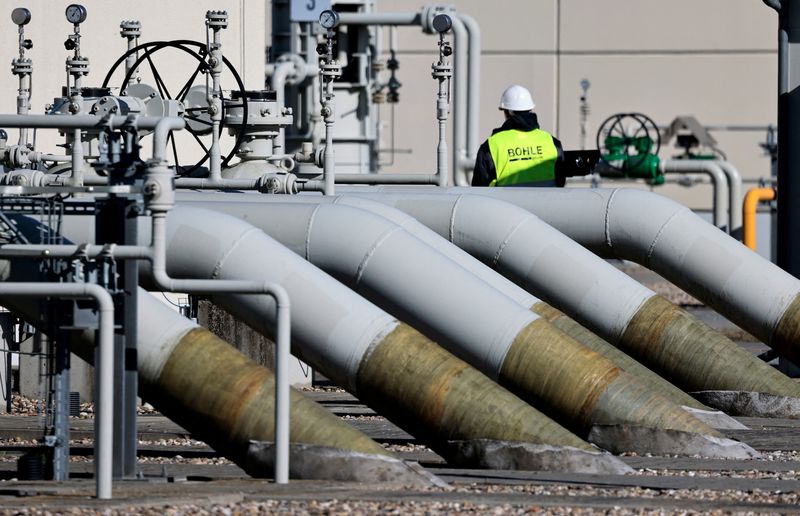By Holger Hansen and Vera Eckert
BERLIN (Reuters) - Germany triggered the "alarm stage" of its emergency gas plan on Thursday in response to falling Russian supplies but stopped short of allowing utilities to pass on soaring energy costs to customers in Europe's largest economy.
The measure is the latest escalation in a standoff between Europe and Moscow since the Russian invasion of Ukraine that has exposed the bloc's dependence on Russian gas supplies and sparked a frantic search for alternative energy sources.
The step is a largely symbolic signal to companies and households but marks a major shift for Germany, which cultivated strong energy ties with Moscow stretching back to the Cold War.
Lower gas flows sparked warnings this week that Germany could fall into recession if Russian supplies halted altogether. A survey on Thursday showed the economy losing momentum in the second quarter.
"We must not fool ourselves: The cut in gas supplies is an economic attack on us by (Russian President Vladimir) Putin," Economy Minister Robert Habeck said in a statement.
Russian gas flows to Europe slow https://graphics.reuters.com/UKRAINE-CRISIS/lbvgnxjzepq/chart.png
Gas rationing would hopefully be avoided but cannot be ruled out, Habeck said:
"From now on, gas is a scarce commodity in Germany ... We are therefore now obliged to reduce gas consumption, now already in summer."
Russia has denied the supply cuts were deliberate, with state supplier Gazprom (MCX:GAZP) blaming a delay in the return of serviced equipment caused by Western sanctions. The Kremlin on Thursday said Russia "strictly fulfils all its obligations" to Europe.
Berlin will provide a 15 billion euro ($15.76 billion) credit line to fill gas storage and launch a gas auction model this summer to encourage industrial users to save gas.
The second "alarm stage" of a three-stage emergency plan means authorities see a high risk of long-term supply shortages. It includes a clause allowing utilities to immediately pass on high prices to industry and households.
Habeck said Germany was not at that point, but the clause might get triggered if the supply squeeze and price gains persisted, pushing power companies deeper into the red.
"If this minus becomes so big that the companies can't bear it any more and they fall down, the whole market threatens to fall down at some point - so a Lehman Brothers effect in the energy system," he said, referring to the U.S. investment bank's 2008 collapse that rippled through global financial markets.
Local utility association VKU asked the government to protect consumers with subsidies or risk utilities going bust because of low-income retail customers defaulting on payments.
The President of the Federal Network Agency, Klaus Mueller, believed it was possible for consumer prices for gas to triple.
"If you extrapolate it, it depends a lot on how you heat, how your building is built, but it can triple the previous gas bill," he told RTL/ntv broadcasters.
The move to Phase 2 had been anticipated since Gazprom cut flows via the Nord Stream 1 pipeline across the Baltic Sea to just 40% of capacity last week.
Data released on Thursday showed Germany has imported 22% less natural gas in the first four months of 2022 but the cost surged 170% over the same period.
Facing dwindling deliveries from main supplier Russia, Germany has since late March been at Phase 1, which includes stricter monitoring of daily flows and a focus on filling gas storage facilities.
"The declaration of the alarm stage does not immediately change the fundamental status quo," German energy provider E.ON said. It was important, though, that the government was preparing and taking steps to stabilize markets and gas supply, it said an emailed statement to Reuters.
RISK OF FULL DISRUPTION
In the second stage, the market is still able to function without the need for state intervention that would kick in the final emergency stage.
Nord Stream 1 is due to undergo maintenance on July 11-21 when flows will stop. Hanns Koenig of consultancy Aurora Energy Services in Berlin said Gazprom might find reasons to drag out the process.
"Extended maintenance of Nord Stream 1 would further tighten the market and make it harder to fill gas storage until winter. This is of course in Russia's strategic interest."
Russia may cut off gas to Europe entirely to bolster its political leverage, the head of the International Energy Agency (IEA) warned on Wednesday, urging Europe to prepare now.
Russian gas flows to Europe via Nord Stream 1 and through Ukraine were stable on Thursday, while reverse flows on the Yamal pipeline edged up, operator data showed.
Dutch wholesale gas prices, the European benchmark, rose as much as 8% on Thursday.
Several countries have outlined measures to withstand a supply squeeze and avert winter energy shortages and an inflation spike that could test Europe's resolve to maintain sanctions on Russia.
Supply cuts have driven German companies to contemplate painful production cuts and resorting to polluting energy sources previously considered unthinkable.
The European Union and Norway unveiled a deal on Thursday allowing the bloc to tap more gas from western Europe's biggest producer.
The EU also signalled a temporary return to coal to plug the gap after calling Moscow's gas supply cuts "rogue moves."

Its climate policy chief Frans Timmermans said 10 of the EU's 27 member countries have issued an "early warning" on gas supply - the first of three crisis levels.
"The risk of full gas disruption is now more real than ever before," he said.